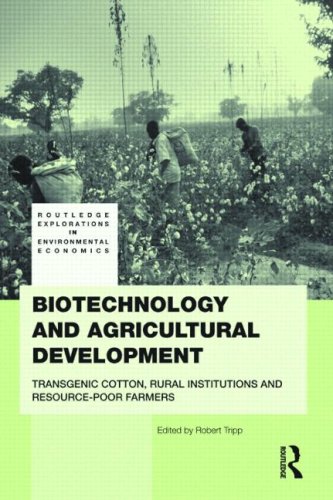

Most ebook files are in PDF format, so you can easily read them using various software such as Foxit Reader or directly on the Google Chrome browser.
Some ebook files are released by publishers in other formats such as .awz, .mobi, .epub, .fb2, etc. You may need to install specific software to read these formats on mobile/PC, such as Calibre.
Please read the tutorial at this link. https://ebooknice.com/page/post?id=faq
We offer FREE conversion to the popular formats you request; however, this may take some time. Therefore, right after payment, please email us, and we will try to provide the service as quickly as possible.
For some exceptional file formats or broken links (if any), please refrain from opening any disputes. Instead, email us first, and we will try to assist within a maximum of 6 hours.
EbookNice Team

Status:
Available4.4
36 reviewsThis book addresses the continuing controversy over the potential impact of genetically modified (GM) crops in developing countries. Supporters of the technology claim it offers one of the best hopes for increasing agricultural production and reducing rural poverty, while opponents see it as an untested intervention that will bring corporate control of peasant farming. The book examines the issues by reviewing the experience of GM, insect-resistant cotton, the most widely grown GM crop in developing countries.
The book begins with an introduction to agricultural biotechnology, a brief examination of the history of cotton production technology (and the institutions required to support that technology), and a thorough review of the literature on the agronomic performance of GM cotton. It then provides a review of the economic and institutional outcomes of GM cotton during the first decade of its use. The core of the book is four country case studies based on original fieldwork in the principal developing countries growing GM cotton (China, India, South Africa and Colombia). The book concludes with a summary of the experience to date and implications for the future of GM crops in developing countries.
This review challenges those who have predicted technological failure by describing instances in which GM cotton has proven useful and has been enthusiastically taken up by smallholders. But it also challenges those who claim that biotechnology can take the lead in agricultural development by examining the precarious institutional basis on which these hopes rest in most countries. The analysis shows how biotechnology’s potential contribution to agricultural development must be seen as a part of (and often secondary to) more fundamental policy change. The book should be of interest to a wide audience concerned with agricultural development. This would include academics in the social and agricultural sciences, donor agencies and NGOs.